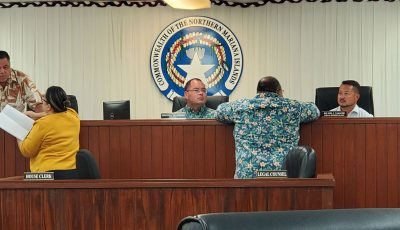HR 560 passes House
Bill grants CNMI-only resident status to investors, long-term workers
The U.S House of Representatives yesterday passed House Resolution 560, or the Northern Marianas Islands Residents Relief Act.
Introduced by Delegate Gregorio Kilili C. Sablan (Ind-MP), H.R. 560 proposes to provide permanent resident status to long-term foreign workers or CW workers, as well as investors, in the CNMI.
In his statement, Sablan said that H.R. 560 would give stability to a small group of investors who were in the Northern Marianas even before federal immigration, as well as foreign workers who have been calling the islands home for decades.
“They have been holding on with short-term visas ever since, never certain from year to year about their business investments, and we want to give the same certainty to a group of long-term workers, some of who have been in the Marianas for 40 years, and to businesses that employ them.”
“Today’s bill, H.R. 560, continues this work of smoothing over the rough places in the application of the national immigration law to my isolated district. H.R. 560 provides the same permanent status, in the Marianas only, that President Trump approved for parolees in June,” Sablan added.
Sablan has been working to make the transition from local to federal control of immigration in the Marianas at least difficult as possible since he first came into office in 2009.
Sablan introduced H.R. 560 on Jan. 15, 2019 to provide an improved immigration status to individuals who have lived in the CNMI since Nov. 28, 2009, provided they meet the requirements to be eligible for the status under the legislation.
The delegate also referenced last year’s signing of Public Law 116-24 by President Donald Trump, which helps the CNMI convert about 1,000 people living under administrative parole to residents with a permanent legal status in the Marianas only, not eligible for any public charge at all.
“Just last week, the administration issued the necessary guidelines to allow those 1,000 people to begin the application process, and they are grateful to the President and to everyone at USCIS Department of Homeland Security for this support,” Sablan said.
In February, the Natural Resources Committee held a hearing on H.R. 560 with Gov. Ralph DLG Torres testifying in favor of the bill.
According to Sablan, the Trump administration did not take a position but their witness noted, and which the Delegate quoted, “Without a sustained labor force, projected investment in the CNMI likely will wither.”
For his closing, Sablan expressed that the House “could do something to avoid that consequence by passing H.R. 560,” and stressed that the bill is Marianas-only, and with bipartisan support.
“I am very grateful to Chairman Raúl Grijalva and Ranking Member Rob Bishop, who both are cosponsors of H.R. 560. Bipartisan support was essential for passage in the House today and will be essential, as well, for passage in the Senate,” Sablan said.
With two-thirds of the vote on the affirmative, H.R. 560 passed the U.S. House of Representatives by voice vote yesterday, and is now at the Senate for deliberation.
Positive news for the CNMI
The passage of the bill in the U.S. House of Representatives is a plus for the Commonwealth, according to Lt. Gov. Arnold I. Palacios.
“This is positive news for our Commonwealth, and we thank and commend Congressman Sablan, Ranking Member Rob Bishop, and the U.S. House for passing this important legislation that will help stabilize our economy and workforce, while providing stable relief for the many families and individuals who have called these islands home.”
Both Torres and Palacios have supported H.R. 560 from the very beginning, with the bill being part of the government’s 902 consultations over the last several years to alleviate workforce concerns on the island, and to strengthen the viability of the CNMI economy.
“We have made our case with both the White House and Congress about this issue, and we are thankful to the leadership we have met over the years that have learned to understand the CNMI’s issues within its economy.”
In his statement, Palacios added that H.R. 560 will allow qualified individuals to not be counted toward the CW cap, which would allow the CNMI to bring in additional workforce to assist in rebuilding homes and schools, while building new businesses to contribute to economic development.
“Most importantly, we are happy for the families and individuals qualified under this bill. It is another step forward, and we will support passage in the U.S. Senate through our communications and partnerships with Republican leaders,” Palacios added.
Answering the need for stability
Representing more than 140 private businesses, government agencies, and nonprofit organizations all working together to sustain the islands’ livelihood, the Saipan Chamber of Commerce congratulated Sablan on the House passage of H.R. 560.
The Chamber also recognized long-term legal residents’ integral role in growing and shaping the Commonwealth.
“Your bill is a positive step in resolving our community’s need for stability,” Chamber president Velma M. Palacios said.
“As we continue to rebuild our economy after multiple catastrophic typhoons, fluctuations in industries, and most especially now with the collapse of our economy due to the coronavirus outbreak, the Commonwealth has a dire need for a solution for our long-term workers and investors.”
Velma Palacios added that the solutions outlined in the bill would provide an avenue for existing investors and foreign workers to remain in the Commonwealth, while not compromising the CNMI’s border security.
Hotel Association of the Northern Mariana Islands president Gloria Cavanagh also expressed appreciation to Sablan, with hopes that the next steps would go by swiftly.
“This is great news,” Cavanagh said. “I would like to thank Delegate Kilili for his hard work in D.C. I hope that the implementation will go smoothly and quickly. With the impending complications with the touchback, this will be somewhat of a relief. However we encourage our D.C. partners to readdress the touchback provision to ensure continuity in our labor market.”
Gerald Narciso, one of the CNMI workers advocating for H.R. 560, also expressed joy on H.R. 560 having been passed by the House of Representatives, and is hoping that the U.S. Senate would act on it soon.



























